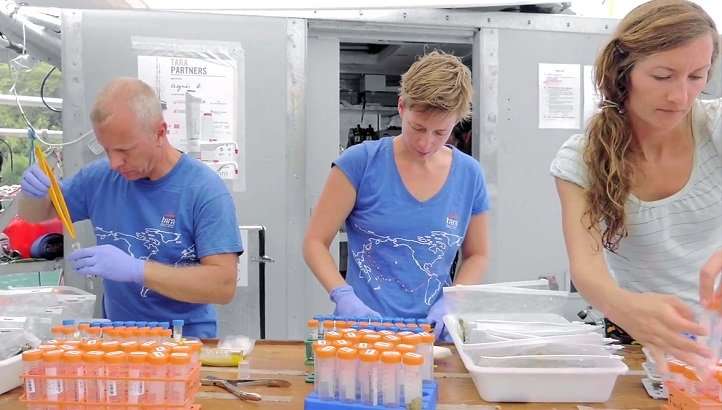Remote corals pay the price of climate change

Corals, even in the most far-flung locations, are being affected by climate change but fare better in marine protected areas.
The coral reefs of a Samoan island in the remote southwest Pacific are in a surprisingly poor condition, highlighting the far-reaching impacts of climate change.
KAUST marine scientists joined colleagues on the research schooner Tara to examine the impacts of climate change on coral reefs surrounding Upolu, an island just 74 kilometers long and 24 kilometers wide, home to about 135,000 Samoans.
Small island populations largely rely on healthy coral reef systems for their livelihoods, but the status of these reefs in remote parts of the world is poorly documented. "Investigating coral reefs in remote locations can teach us about global and local impacts on these ecosystems," says molecular biologist Maren Ziegler.
Ziegler was chief scientist on board the Tara Pacific Expedition toward the end of 2016 when researchers surveyed 124 sites over 83 kilometers of Upolu's coastal coral reefs. "Despite the distance from large urban centers, live coral cover was extremely low," says Ziegler. Live coral covered less than one percent of half the sites surveyed and below 10 percent at 78 percent of the study sites on the reefs.
"This means that climate change, and in particular global warming, is probably affecting coral reefs everywhere on our planet now, even around small island states in the Pacific that are only contributing a very small fraction of the global greenhouse gas emissions."
Two of the reef fish species known to live in the area were 10 percent smaller off Upolu than at neighboring islands. They swam in small schools of just five fish, yet they were commonly found in schools of 20 to 60 off other Pacific islands. These observations suggest that the fish habitat is degraded and that heavy fishing is affecting the coastal ecosystem around Upolu.
"Since the reefs all around the island are affected, it is likely that global factors such as storms and global warming, which causes coral bleaching and death, are affecting the reefs around Upolu," says Ziegler. "Local stressors, such as high loads of pollution and high fishing pressure, make it more difficult for coral reefs to withstand global stressors or to recover from them."
Two areas with 40 percent and 60 percent coral cover were found within marine protected areas established in 1999. "Local action to protect local resources can go a long way," says Ziegler.
A team at KAUST's Red Sea Research Center, led by marine scientist Christian Voolstra, is preparing to conduct a survey to identify Red Sea corals that demonstrate strong resilience to environmental pressures. "We can also study these corals to get a more detailed understanding of mechanisms of stress resilience and to assist reef restoration efforts," he says. Even though the Red Sea coral reefs are in comparatively good condition, "we need to prepare to have the tools available to mitigate coral bleaching and to help them recover," he says.





















